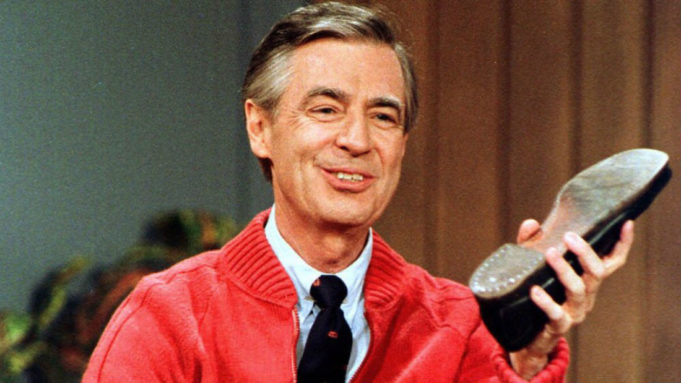Just about every review of Won’t You Be My Neighbor? says something about how timely it is, so I won’t do that. Instead, I’ll say this: While I was watching this documentary about Fred Rogers and his long-running TV show for kids, I thought that this movie is a direction that Christian film could go in to get itself out of its stagnation. It probably won’t happen, because the crowd that goes to see God’s Not Dead and its ilk goes to hear their own beliefs parroted back to them. As Morgan Neville’s documentary makes clear, Fred Rogers’ message is likely to piss them off. Well, they’re missing out on a host of good movies about religion, including the Pope Francis documentary, First Reformed, Disobedience, and now this film, which expands to Tarrant County theaters this week.
The film unspools the story of how this skinny ordained Presbyterian minister from Pittsburgh became an unlikely TV star, with his talent for music and his faith that children are wiser than we generally give them credit for. Neville conducts interviews with personal friends, actors on the show (those two groups frequently overlapped), and Rogers’ two sons, one of whom says it wasn’t easy growing up “with the second Christ as my dad.” (I wish Neville had asked him to elaborate a bit more.) The story covers Fred Rogers’ brief foray into television for adults, which ended abruptly when he heard the story of a 4-year-old boy who jumped out a window because he thought he could fly like Superman.
In vain will you wait for the revelation that Rogers was secretly gay or a sexual predator or a tyrant on the set or so absorbed in his work that he neglected his kids. Such rumors swirled around Mister Rogers, mostly because people couldn’t believe that he really was the same man offscreen as on TV. We’re given ample evidence that that was indeed the case, like his testimony before a U.S. Senate committee in 1969 that had met to defund public television. In grainy black-and-white footage, you see Rogers win over Sen. John Pastore, a staunch opponent of public TV, by reciting the lyrics to his own song “What Do You Do With the Mad That You Feel?” How many of us would have the nerve to do that? Yet it doesn’t feel like an act of bravado, but rather a simple statement by a man with the courage of his convictions and the belief that he can reach the flinty senator, and so he does.
Of course, our Twitter troll of a president lurks in the background. Even though Trump is never mentioned by name here, it’s hard not to notice that during the first week of episodes of Mister Rogers’ Neighborhood, King Friday XIII builds a wall around his kingdom to keep people out. Through the tumult of his times, Rogers addressed the outside world in his own soft-shoed way; François Clemmons, the black opera singer who portrayed Officer Clemmons on the show, notes that an episode in which he and Mister Rogers both dipped their feet into a kiddie pool was Rogers’ rebuke to public swimming pools that remained racially segregated at the time. (Clemmons’ real-life homosexuality proved a sterner test of Rogers’ tolerance, though he passed it in the end.) Sen. Robert Kennedy’s assassination happened during the show’s first year, and Rogers did what no other children’s TV host at the time would have done and discussed the killing on the show, with Daniel Striped Tiger (Rogers’ fearful alter ego) asking about it. At a time when Sesame Street was catering to children with punchy visuals and quick sketches, Mister Rogers did the opposite and drew them in with slowness and silence.
Rogers never snapped at a child on his show, even the inevitable ones that gave him reason, and therein lies the critique of Mister Rogers’ ethos, which is frequently advanced by conservatives: By telling all the kids that they’re perfect the way they are, he created a culture of spoiled, entitled brats with inflated self-esteem. After all, if everyone’s special, then no one is, right? There is something to this line of thinking, and yet I find Rogers’ generosity of spirit to be rooted specifically in his religious faith. Jesus teaches us that God’s love encompasses us all, no matter the good or bad things we’ve done, and so Mr. Rogers tells the kids watching his show that they don’t need to be anything other than what the Creator made them to earn His grace. In this way, Mister Rogers was as radical in his time as Christianity once was. It’s a way that many self-professed Christians (like the Westboro Baptist Church, which picketed Rogers’ funeral in 2003 because of his inclusivity) would do well to adopt. Heaven knows that I myself fall short of Fred Rogers’ state of grace all too often in my life, but watching Won’t You Be My Neighbor? makes me want to renew my efforts. Some documentaries like these are like eating vegetables. This film about a man who made TV and the world better is a plate of vegetables tasty enough to make you want to eat them.
Won’t You Be My Neighbor?
Starring Fred Rogers. Directed by Morgan Neville. Rated PG.













Please don’t think, by this review, that this film is in any way “political”. This reviewer obviously has their opinions and watched it though glasses of their own tinting. Watch it with and open mind and experience Fred Rogers’ simple yet heroic appeal to and influence upon our children.
Don’t refer to me as “their,” I’m not royalty. I watch every movie through the prism of my own opinions, as do you, and this movie clearly has political opinions of its own.